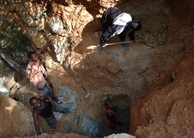From Earth Common Journal VOL. 6 NO. 1The Technological Abyss: Heideggerian Ontology and Climate ChangeMoving Away from Enframing: Listening and LanguageThis does not constitute a complete escape, for we must still aim toward a move away from enframing when we recognise its essence, but it marks the first and most important step—realising ourselves as "the one[s] spoken to" (Heidegger, 2008b, p. 332) by revealing in whatever form. It may seem, based on this discussion, that humans are helpless in this process. We are the vessels of revealing, and if we happen to be apportioned enframing rather than another more self-reflexive kind of truth we cannot change this. However, the way in which we can affect change also functions as the ultimate denial of the human will. We ourselves do not control revealing (p. 323), this much is undeniably true. But we do have the potential to exercise control over ourselves in a way that can be beneficial to our relationship with it. This is where our potentiality shows itself (Heidegger, 1953/2010b, p. 42). Our aim is to achieve a change in revealing from the limits of enframing into a more original version, but the essence of "technology cannot be led into the change of its destining without the cooperation…of [humans]" (Heidegger, 1977, p. 39). Revealing, as the manner in which truth is apportioned, changes and adapts of own accord. In its current iteration, it has "adapted itself into enframing" (p. 38). So, because humans are the vessels through which revealing destines, we must prepare ourselves (p. 40) in order to allow revealing to move away from its current limits. If we are able to recognise ourselves as "needed and used" (Heidegger, 2008b, p. 337) by revealing, we will also be able to recognise ourselves as "needed and used for the restorative surmounting of the essence of technology" (Heidegger, 1977, p. 39). Because we currently linger in a state of immovable ignorance, revealing as such is also rendered immovable and incapable of change/adaptation. But an escape from our ignorance in this matter will enable a potential escape from enframing itself. Language and PreparationBefore we can decide whether or how Heidegger's (1977) project of transcendence can be applied to environmental philosophy or any other ontic issue, we must "prepare" (p. 40) by thinking rather than acting. The opening line of his Letter on Humanism, questions the "essence of action" (Heidegger, 2008a, p. 217). Action, as it is defined by the human will, is evaluated with regard to practical utility—its potential for achievement. But "human achievement alone can never banish" (Heidegger, 2008b, p. 339) enframing. Thinking here retains primacy, for it "acts insofar as it thinks" (Heidegger, 2008a, p. 217). To prepare, then, is to act through thinking, to listen rather than speak. There are but two possible outcomes of our interactions with revealing: nearness or alienation, both of which are essentially governed by language. Language is the "primal dimension within which [we are] first able to correspond at all to Being and its claim" (Heidegger, 1977, p. 41), but we are currently alienated from it in "homelessness" (Heidegger, 2008a, p. 241). Therefore, any change in our portion of revealing requires "nearness" (p. 242). In our ensnarement we utilise explanation, description, and "frantic measuring and calculating" (p. 226) as the method of enquiry. These share something in common; speech. But the revelation of our predicament depends on the opposite of this. We are "spoken to" (Heidegger, 2008b, p. 332) by being as such, so we should focus on "response" (Heidegger, 2013, p. 182), and listening. Our utilisation of language is, at present, equivalent to our treatment of technological apparatuses. Its function is defined as an "expression" of the human will (Heidegger, 2013, p. 190)—a means to an end. As a means, language is used in a "calculative business like way…with explanations and proofs" (Heidegger, 2008a, p. 223). Heidegger describes this occurrence as the "downfall of language" (p. 222), in which "language surrenders itself to our mere willing and trafficking as an instrument of domination over beings" (p. 223). This works to further bolster our conceit and reliance on the human will. But "the human will to explain just does not reach the simple" (Heidegger, 2013, p. 177). Our relation to being is indeed simple, though we have been separated from it. Heidegger (1971/2013) asks, "that a thinking is, ever and suddenly—whose amazement could fathom it?" (p. 11). By this he means that the thinking and language, which connects us to revealing and recognises it as prime "brings no wisdom" or "salvation" (p. 183). It connects us to our own simple dwelling in our home as the vessels of the event of truth (Heidegger, 2008a, p. 242). Both science and philosophy "measure deeds by the impressiveness and successful achievements of praxis" (Heidegger, 2008a, p. 263). To them, thinking must be profound and novel enough to initiate a change in its ground if it is to be considered effective in inciting change. This attitude, as a result of the hold enframing exercises on language, contributes to its inescapability and thoroughly pervades the sciences, which measure change "by the extent to which [they are] capable of a crisis in [their] basic concepts" (Heidegger, 1953/2010b, p. 9). In doing this, it traps language in a desperate, never ending search for innovation, novelty, and explication to be objectified as a mechanism for these crises. Thinking that is vetted through language such as this does not attest to our essential relationship with revealing. In its extreme simplicity it ultimately becomes "unrecognizable to us" (Heidegger, 2008a, p. 263) in our preoccupation with action in the form of explanatory and technical language. As a result of our preoccupation with explication, one of the most problematic aspects in current technological discourse is its focus on social, political, and economic policy—even if that policy is to abolish policy altogether, or even technology—for as soon as we focus our efforts on policy changes we have already cemented our ensnarement in enframing. Such policies as environmental management, whether interested in conservation or extraction, only work to confirm our status as "tyrant[s]" (Heidegger, 2008a, p. 234) and cement our alienation. But abandoning enframing does not presuppose the abolition of technology. Even if we succeed in escaping enframing, "technology will not be struck down; and it most certainly will not be destroyed" (Heidegger, 1977, p. 38). Heidegger is adamant that "technology will not be overcome [überwunden] by [humans]" (p. 39). In our search for primal transcendence, we do not struggle with technological apparatuses, only with our own will. Our aim is to initiate and maintain a process wherein "technology will be surmounted [verwunden] in a way that restores it to its yet concealed truth" (p. 39). Technological apparatuses are used by enframing as a mechanism of control. Hence, if we can surmount enframing these apparatuses will be restored to their true identities along with any other thing or being. Whether we deplore technology or venerate it, focusing on these issues only strengthens our fascination with the human will. Taking these concerns as primary only succeeds in demonstrating human conceit—our belief in our own dominance. To escape this unfounded confidence, we must foster a proclivity for a "mode of listening, for the command of [revealing]" (Heidegger, 1971/2013, p. 207). Just like enframing, language is not a human activity, though we take it to be so, adding it to "the total economy of achievements by which [humans make themselves]" (p. 190). But these achievements cannot aid us in egress (Heidegger, 2008b, p. 339). We must therefore look to "human reflection" (p. 339). This presupposes a certain level of listening. Reflecting denotes thinking, through which we must carefully ponder the danger inherent in enframing and open ourselves to receiving the complete "appeal" (Heidegger, 1971/2013, p. 182) of revealing. Language is the medium through which this thinking can occur (Heidegger, 1977, p. 41). "Language speaks" (Heidegger, 1971/2013, p. 207), and in its speech lies the connection between human thinking and truth. But if its speech is drowned out by incessant and impulsive "utterance" (p. 195) humans alienate themselves from the only medium through which they can gain nearness to revealing (Heidegger, 1977, p. 41). Rescuing language from the human will is the first step in escaping enframing because it is the basis for thinking. As such, we must rescue language and use it to foster a thinking through which "primal correspond[ence]" (p. 41) (i.e., transcendence) and therefore access to the realm of truth is possible. Until we succeed in this, all ethical considerations reside in obscurity because such issues demand extensive clarification. At the present, our ethical discourse (whether traditional or otherwise) cannot possibly garner legitimate results because it is limited to first-order information and corrupted by our illegitimate reliance on the human will. Environment, Ethics, and TranscendenceIn light of this, what, then, is the applicability of an escape from enframing on ethical—and specifically environmental—consideration? Heidegger, in demonstrating his project as an attempt to discern things simply as they give themselves (Crowell, 2013, p. 24), also necessarily defines the outcome of egress from any incomplete account of truth. His aim is primal transcendence, to allow anything with which we interact to appear in a meaningful way, unaltered by limitations to truth. Much research has been conducted recently on this very framework as an avenue toward adapting Heidegger's phenomenology to environmental philosophy. His conception of Gelassenheit, often translated as "letting beings be" (Rentmeester, 2015, p. xv) or "releasement" (Heidegger, 1944/2010a, p. xi) has excited various attempts at appropriation. The "eco-phenomenological movement" also utilises these terms, taking their combined theme as a focal point to a new "way of living" in light of Heidegger's suggestions (Rentmeester, 2015, p. xvii). However, opponents of attempts like these are quick to point out a flaw that they consider detrimental to any notion of Heidegger as environmentally conscious. His explanation of the human being as Dasein differentiates it from any other entity (p. xvii). He must, therefore, answer a charge of anthropocentrism.5 Hence if he cannot ameliorate this alleged problem, we ought to cast him off as irreparably corrupted by human interest, though this would be somewhat ironic in light of his substantial denial of the human will. I will, however, argue that Heidegger's conception of Dasein, though admittedly an essential differentiation between humans and any other being, does not lend itself to anthropocentrism. Heidegger's phenomenological approach to human-object interaction does indeed afford humans an explicit distinction. They are worldly in opposition to other "worldless" (Heidegger, 1953/2010b, p. 55) beings. Humans are able to understand their own being and can therefore garner meaning from the world around them. A table has meaning because it is presented to us in a meaningful way (Heidegger, 1987/2001, p. 8). The table itself, though it "exist[s] in its own way" (p. 8), it is not "ontologically situated in…space" (p. 9). It is solely grounded in "objective presence," which renders it inert— ready to present itself only in light of the "touch" of a being that "has the kind of being of being-in" (Heidegger, 1953/2010b, p. 55). Ontological awareness grants worldliness, and hence affords humans "being-in-the-world" (p. 56), wherein by virtue of this awareness, we also recognise our own facticity—the contingency of our objective presence (pp. 55-56). This framework does sound remarkably anthropocentric, especially with respect to his denomination of useful entities as defined by "handiness [Zuhandenheit]" (p. 69). However, because Heidegger's general project is that of primal transcendence, connecting him to anthropocentrism is inconsistent. Enframing is a human issue; recognising it is necessary for any kind of framework, anthropocentric or not. Heidegger's project is not to reduce all considerations to the pursuit of human interests, but rather to open up human interest to truth. To accuse him of anthropocentrism is to make the very mistake he is warning us of—to apply partial truth as primal. To return to the issue of applicability, Casey Rentmeester (2015) considers this project a reason why Heidegger's thought is relevant to environmental ethics, arguing that in light of his views, we can "reflect on a more appropriate relation with nature" (p. xxi). This, however, presents a problem in relation to Heidegger's own views. This paper aims at evaluation and clarification regarding the ground upon which political, social, and economic policies regarding climate change (along with any other environmental concerns) stand. This ground informs any ethical considerations that may arise from our treatment of its various aspects, which in turn informs any policy decisions. The reason for my inclusion of ontology, then, is Heidegger's aim. He is interested in achieving complete "intelligibility" (Crowell, 2013, p. 27) for beings with which we interact, for "things can no longer pierce through the objectification to show their own" (Heidegger, 2013, p. 110) under the tyranny of enframing. The extent to which things are ontologically intelligible is reflected in ethical and policy based decisions regarding all social, political, and economic considerations. So to employ any decision making methods without such knowledge is folly. When Rentmeester (2015) references a "Heideggerian environmental ethic (emphasis added)" (p. xxi), he demonstrates a misunderstanding of Heidegger's framework. Heidegger (2008a) proves himself not only to be adverse to ethics as they are defined within the philosophical tradition, but in answer to the question "can we obtain from such knowledge [of being] directives that can be readily applied to our active lives?" (p. 259) he comprehensively denies any relevance. Any thinking that is able to access truth "comes to pass before [the] distinction" (p. 259) between theoretical and practical concerns. In other words, ethics cannot even be considered if we do not have access to things' intelligibility. This is why Rentmeester's (2015) use of Gelassenheit as letting beings be (p. xv) to suggest a relation to ethics is misdirected. There is no ethical connection. To let beings be is to allow them to present themselves in their truth, which means that this is merely another way of describing "restorative surmounting" (Heidegger, 1977, p. 41). Ereignis, translated as the "event" of truth is conceptualised by Rentmeester as an "event that is to follow enframing" (p. 66). It is, then, the completion of the partial revealing we currently reside in (Heidegger, 2008b, p. 335) and can be connected reliably with the interplay between the danger and the saving power. With its complete advent, Ereignis will allow us to finally execute the restorative surmounting that Heidegger is so eager to reach and access the realm of truth. And though he is adamant that humans cannot alter the trajectory of the event (Heidegger, 2008b, p. 323), they can prepare by offering themselves as a possible destination by bringing themselves closer to being, finally realising their potential to be its guardians (Heidegger, 2013, p. 182). Heidegger is indeed suggesting a "new way of living" (Rentmeester, 2015, p. xvii), but if Heidegger is formulating a way of living, it must necessarily be a way of being, and therefore precedes any possible notion of moral imperatives. To look forward toward ethics, policy, or even a complete re-evaluation of our lifestyle, the way in which we receive truth must be changed. What results from a successful "change" (Heidegger, 1977, p. 39) is primal transcendence. It is, in this sense, the freedom Heidegger aspires to in The Question Concerning Technology (Heidegger, 2008b, p. 311), which Rentmeester connects to Gelassenheit (Rentmeester, 2015, pp. 70-71). It is a freedom from, rather than a freedom to—a freedom from the concealment enacted by enframing. Rentmeester details what he believes would be specific outcomes regarding human interaction with the environment after such a change, but such predictions cannot be reliably made. Though "Heidegger does offer a vision of a more appropriate way in which to understand the world around us" (p. 70), what is most important is "ek-sistence" (Heidegger, 2008a, p. 248). Once we ek-sist, we ourselves are free to interact with beings in an authentic way. Only in light of this freedom can we potentially let beings be, for clarity does not guarantee proper (or any) ethical consideration of what has been made clear. In fact, without this clarity, we cannot even understand what it would be like to let beings be. As long as the tyranny of enframing persists, we can only base our decisions on "first-order [ontic] inquiry" which will "never reveal [an] entity's being" (Crowell, 2013, p. 27). Whether or how we change our "comportment" (Rentmeester, 2015, p. 70) is unimportant as long as we continue to reside under this tyranny, for "transcendence precedes every possible mode of comportment in general" (Crowell, 2013, p. 27). ConclusionThough it is not clear whether humans are at present capable of "lending a hand to the essence, the coming to presence of Being" (Heidegger, 1977, p. 40)—whether they can reach the realm in which primal transcendence may be accomplished—is unclear. On our current trajectory, we have begun to recognise a new worrying symptom of enframing—large scale, global climate intervention. However, this issue, like any other ethical concern, cannot be tackled until we pull ourselves out of the abyss. Enframing prevents any entity with which we may interact in the pursuit of some ethical decision from presenting itself as itself. We cannot judge ethically and adjust policies if we do not have the proper facts. In this case, fact takes on a much wider definition than usual. We, in our current entrapment, are robbed of truth. When confronted by this limitation and its uncomfortable symptoms, humans have decided to look to their will as a source of deliverance. Policy decisions, changes, and even complete denials of technology are the result of this. Our will is all we can think of to rely on to mediate the concerns created precisely by our will. But none of these solutions, as long as we remain on our precarious ledge within the abyss of enframing, are legitimate. They constitute much of the erroneous and damaging utterance, important to us only because of their status as exemplifications of our own agency. However, if we finally cast off our delusions of dominance and listen rather than speak, language will once again return to us and propel us into nearness to revealing. We must, as it were, think before we can speak. If, and only if, we succeed in doing this, can we then assess solutions to current climate change and any other technological issues without falling prey to misplaced confidence.* AcknowledgementI would like to thank Dr. Charles Rodger, whose advice and comments aided me greatly in the writing of this article. AuthorAaron Mazo is a student in the Honours Philosophy program at the University of Alberta. His research interests include Heidegger, phenomenology, and German idealism. Footnotes
ReferencesBiello, D. (2010, April 6). What Is Geoengineering and Why Is It Considered a Climate Change Solution? Scientific American. Retrieved from http://www.scientificamerican.com/article/geoengineering-and-climate-change/ Causes of Climate Change. (2016, February 8). Retrieved from https://www3.epa.gov/climatechange/science/causes.html Crowell, S. (2013). Normativity and Phenomenology in Husserl and Heidegger. New York, NY: Cambridge University Press. Gambrel, J. (2012). Virtue Theory and Genetically Modified Crops. In D. Schmidtz & E. Willot (Eds.), Environmental Ethics: What Really Matters, What Really Works (2nd ed.) (pp. 622-626). New York, NY: Oxford University Press. Gelven, M. (1989). A Commentary on Heidegger's Being and Time. DeKalb, IL: Northern Illinois University Press. Gorte, R., Sheikh, P. (2010). Deforestation and Climate Change. CRS Report for Congress. Retrieved from http://forestindustries.eu/sites/default/files/userfiles/1file/R41144.pdf Heidegger, M. (1977). The Turning. In J. G. Gray & J. Stambaugh (Eds.), The Question Concerning Technology and Other Essays (pp. 36-49) (W. Lovitt, Trans.). New York, NY: Harper & Row, Publishers, Inc. (Original Work Published 1962) Heidegger, M. (2001). Zollikon Seminars, Protocols—Conversations—Letters. M. Boss (Ed.). (F. Mayr & R. Askay, Trans.). Evanston, IL: Northwestern University Press. (Original Work Published 1987) Heidegger, M. (2008a). Letter on Humanism. In D. F. Krell (Ed.), Basic Writings. (pp. 217-265). New York, NY: HarperCollins Publishers. Heidegger, M. (2008b). The Question Concerning Technology. In D. F. Krell (Ed.), Basic Writings. (pp. 311-341). New York, NY: HarperCollins Publishers. Heidegger, M. (2010a). Country Path Conversations. (B. W. Davis, Trans.). J. Sallis (Ed.). Bloomington, IN: Indiana University Press (Original work published 1944) Heidegger, M. (2010b). Being and Time. (J. Stambaugh, Trans.). D. J. Schmidt (Ed.). Albany, NY: State University of New York Press (Original work published 1953) Heidegger, M. (2013). Poetry, Language, Thought. (A. Hofstadter, Trans.). New York, NY: Harper & Row, Publishers. (Original work published 1971) McLuhan, M. (1969). Understanding media: The extensions of man. Toronto, ON: McGrawHill Book Company. Rentmeester, C. (2015). Heidegger and the Environment. Lanham, MD: Rowman & Littlefield International Ltd. Sontag, S. (2009). Styles of Radical Will. London, England: Penguin Group Sustain and Protect. (n.d.) Retrieved from oregonforests.org, http://oregonforests.org/content/clearcutting Taylor, P. (1983). In Defense of Biocentrism. Environmental Ethics, 5(3), 237-243. doi:10.5840/enviroethics19835322 Wong, P. (2014). Maintenance Required: The ethics of geoengineering and postimplementation scenarios. Ethics, Policy, & Environment, 17(2), 186–191. doi:10.1080/21550085.2014.926090 Suggested Reading from Inquiries Journal
Inquiries Journal provides undergraduate and graduate students around the world a platform for the wide dissemination of academic work over a range of core disciplines. Representing the work of students from hundreds of institutions around the globe, Inquiries Journal's large database of academic articles is completely free. Learn more | Blog | Submit Latest in Environmental Studies |



















